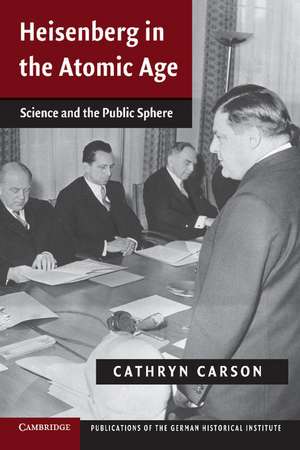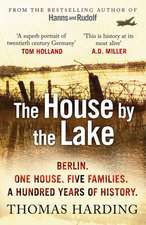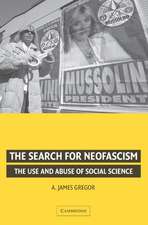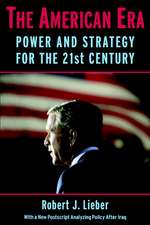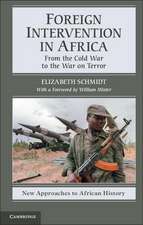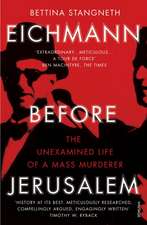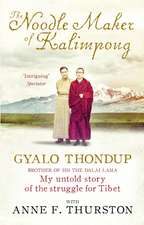Heisenberg in the Atomic Age: Science and the Public Sphere: Publications of the German Historical Institute
Autor Cathryn Carsonen Limba Engleză Paperback – 20 aug 2014
| Toate formatele și edițiile | Preț | Express |
|---|---|---|
| Paperback (1) | 436.68 lei 6-8 săpt. | |
| Cambridge University Press – 20 aug 2014 | 436.68 lei 6-8 săpt. | |
| Hardback (1) | 575.61 lei 6-8 săpt. | |
| Cambridge University Press – 10 ian 2010 | 575.61 lei 6-8 săpt. |
Din seria Publications of the German Historical Institute
- 14%
 Preț: 757.52 lei
Preț: 757.52 lei - 8%
 Preț: 530.72 lei
Preț: 530.72 lei -
 Preț: 283.52 lei
Preț: 283.52 lei - 14%
 Preț: 757.52 lei
Preț: 757.52 lei -
 Preț: 352.63 lei
Preț: 352.63 lei - 11%
 Preț: 695.06 lei
Preț: 695.06 lei -
 Preț: 207.41 lei
Preț: 207.41 lei -
 Preț: 282.17 lei
Preț: 282.17 lei - 11%
 Preț: 574.38 lei
Preț: 574.38 lei -
 Preț: 289.39 lei
Preț: 289.39 lei - 14%
 Preț: 1279.78 lei
Preț: 1279.78 lei -
 Preț: 327.41 lei
Preț: 327.41 lei -
 Preț: 439.33 lei
Preț: 439.33 lei - 11%
 Preț: 552.00 lei
Preț: 552.00 lei - 11%
 Preț: 524.04 lei
Preț: 524.04 lei - 14%
 Preț: 871.52 lei
Preț: 871.52 lei - 11%
 Preț: 458.99 lei
Preț: 458.99 lei - 14%
 Preț: 755.87 lei
Preț: 755.87 lei -
 Preț: 453.12 lei
Preț: 453.12 lei - 14%
 Preț: 756.70 lei
Preț: 756.70 lei -
 Preț: 331.28 lei
Preț: 331.28 lei -
 Preț: 318.06 lei
Preț: 318.06 lei - 14%
 Preț: 755.69 lei
Preț: 755.69 lei -
 Preț: 353.83 lei
Preț: 353.83 lei - 11%
 Preț: 578.20 lei
Preț: 578.20 lei -
 Preț: 321.90 lei
Preț: 321.90 lei -
 Preț: 284.78 lei
Preț: 284.78 lei - 14%
 Preț: 937.61 lei
Preț: 937.61 lei -
 Preț: 471.93 lei
Preț: 471.93 lei -
 Preț: 422.91 lei
Preț: 422.91 lei - 11%
 Preț: 589.88 lei
Preț: 589.88 lei -
 Preț: 315.72 lei
Preț: 315.72 lei - 11%
 Preț: 693.36 lei
Preț: 693.36 lei - 14%
 Preț: 870.01 lei
Preț: 870.01 lei -
 Preț: 287.07 lei
Preț: 287.07 lei - 23%
 Preț: 950.10 lei
Preț: 950.10 lei -
 Preț: 384.34 lei
Preț: 384.34 lei -
 Preț: 448.49 lei
Preț: 448.49 lei - 5%
 Preț: 312.62 lei
Preț: 312.62 lei -
 Preț: 319.52 lei
Preț: 319.52 lei -
 Preț: 243.74 lei
Preț: 243.74 lei
Preț: 436.68 lei
Nou
Puncte Express: 655
Preț estimativ în valută:
83.57€ • 87.14$ • 69.45£
83.57€ • 87.14$ • 69.45£
Carte tipărită la comandă
Livrare economică 20 martie-03 aprilie
Preluare comenzi: 021 569.72.76
Specificații
ISBN-13: 9781107436954
ISBN-10: 1107436958
Pagini: 566
Ilustrații: 10 b/w illus.
Dimensiuni: 156 x 234 x 32 mm
Greutate: 0.86 kg
Editura: Cambridge University Press
Colecția Cambridge University Press
Seria Publications of the German Historical Institute
Locul publicării:New York, United States
ISBN-10: 1107436958
Pagini: 566
Ilustrații: 10 b/w illus.
Dimensiuni: 156 x 234 x 32 mm
Greutate: 0.86 kg
Editura: Cambridge University Press
Colecția Cambridge University Press
Seria Publications of the German Historical Institute
Locul publicării:New York, United States
Cuprins
Part I. Introduction: 1. Science and the public sphere; 2. Tracking Heisenberg; Part II. Culture: 3. The scientist as bildungsburger; 4. Physics as philosophy; 5. The culture of the vent; 6. Bildung als konsumgut: dilemmas of the literary public sphere; Part III. Politics: 7. Science, politics, and power: initial orientations; 8. A new research system; 9. Science policy in the atomic age; 10. Expansion and uncertainty; 11. Politics in the public sphere; 12. Speaking of the Third Reich: denazification; 13. Speaking of the Third Reich: war work; 14. Speaking of the Third Reich: into the public sphere; Part IV. Scientific Reason in the Public Sphere: 15. The public reach of reason after 1945; Epilogue.
Recenzii
'In this deeply researched and imaginatively conceived book, Carson authoritatively delineates Werner Heisenberg's influential role in the shaping of West Germany, integrating his engagements in politics, physics, and culture and revealing how his vision was shadowed by the history of the Third Reich. A must read for anyone interested in Heisenberg the man and the reconstruction of his country during the postwar years.' Daniel J. Kevles, Yale University
'Heisenberg in the Atomic Age is a brilliant interpretation of the co-evolution of the scientist-intellectual and the public sphere in postwar West Germany. Historians have for decades examined Werner Heisenberg's path-breaking contribution to quantum mechanics and debated his scientific and moral roles in the Third Reich where he directed Germany's ill-fated atomic bomb project. Cathryn Carson is the first to examine in detail Heisenberg's equally important public role after 1945 when physics and politics mixed in a volatile combination over the issue of nuclear power, both civilian and military. At a time when the philosopher Jürgen Habermas was articulating his notion of the public sphere, Heisenberg's public discourse helped to shape how reason could be used to express dissent in West Germany's new parliamentary democracy. Written with élan and elegance and based on meticulous research and eye-opening interviews, Carson's refreshing study is required reading for anyone interested in postwar politics and society.' Kathryn M. Olesko, Georgetown University
'Heisenberg in the Atomic Age is a remarkable book: authoritatively informative, deeply insightful, impressively erudite and sensitive, yet readily accessible. It offers wide-ranging new perspectives on Heisenberg and on the foundations and evolution of his physics, philosophy, politics and persona; on the culture, politics and science of pre and post World War II Germany; and on the atomic age and its intellectual-cultural battles. Altogether it sets new standards for biographical writing.' Silvan S. Schweber, Harvard University
'Cathryn Carson has written a scientific and intellectual biography of Werner Heisenberg in the postwar age that complements and supplements David Cassidy's path-breaking work. Carson's methodological approach, and in particular her use of the concept of the 'public sphere,' is innovative and persuasive. Both the organization of the book and its prose are clear and straightforward, which make the book accessible. However, her intelligent and subtle analysis, argument, and use of sources are also intellectually challenging.' Mark Walker, Union College
'Carson succeeds magnificently in interrelating the scientific persona of the most famous physicist in post-war Germany with his role in the process of reshaping German science and society for a democratic political order. Heisenberg is a landmark study in how scientists can and should participate in building the Habermasian public sphere of rational discussion and critical reflection.' Norton Wise, University of California, Los Angeles
'Heisenberg in the Atomic Age is a brilliant interpretation of the co-evolution of the scientist-intellectual and the public sphere in postwar West Germany. Historians have for decades examined Werner Heisenberg's path-breaking contribution to quantum mechanics and debated his scientific and moral roles in the Third Reich where he directed Germany's ill-fated atomic bomb project. Cathryn Carson is the first to examine in detail Heisenberg's equally important public role after 1945 when physics and politics mixed in a volatile combination over the issue of nuclear power, both civilian and military. At a time when the philosopher Jürgen Habermas was articulating his notion of the public sphere, Heisenberg's public discourse helped to shape how reason could be used to express dissent in West Germany's new parliamentary democracy. Written with élan and elegance and based on meticulous research and eye-opening interviews, Carson's refreshing study is required reading for anyone interested in postwar politics and society.' Kathryn M. Olesko, Georgetown University
'Heisenberg in the Atomic Age is a remarkable book: authoritatively informative, deeply insightful, impressively erudite and sensitive, yet readily accessible. It offers wide-ranging new perspectives on Heisenberg and on the foundations and evolution of his physics, philosophy, politics and persona; on the culture, politics and science of pre and post World War II Germany; and on the atomic age and its intellectual-cultural battles. Altogether it sets new standards for biographical writing.' Silvan S. Schweber, Harvard University
'Cathryn Carson has written a scientific and intellectual biography of Werner Heisenberg in the postwar age that complements and supplements David Cassidy's path-breaking work. Carson's methodological approach, and in particular her use of the concept of the 'public sphere,' is innovative and persuasive. Both the organization of the book and its prose are clear and straightforward, which make the book accessible. However, her intelligent and subtle analysis, argument, and use of sources are also intellectually challenging.' Mark Walker, Union College
'Carson succeeds magnificently in interrelating the scientific persona of the most famous physicist in post-war Germany with his role in the process of reshaping German science and society for a democratic political order. Heisenberg is a landmark study in how scientists can and should participate in building the Habermasian public sphere of rational discussion and critical reflection.' Norton Wise, University of California, Los Angeles
Notă biografică
Descriere
Heisenberg in the Atomic Age explores the transformations of science's public presence in the postwar Federal Republic of Germany.
